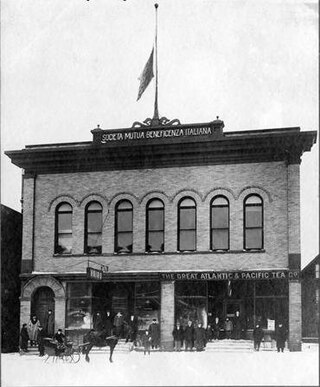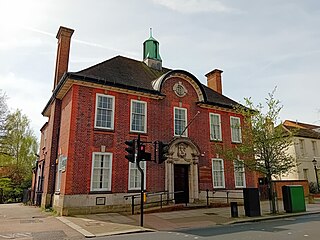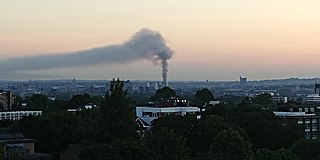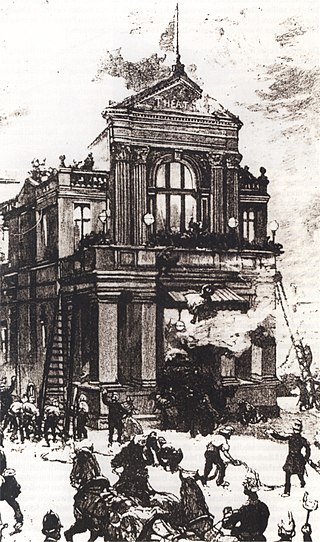
The Italian Hall disaster was a tragedy that occurred on Wednesday, December 24, 1913, in Calumet, Michigan, United States. Seventy-three people – mostly striking mine workers and their families – were crushed to death in a stampede when someone falsely shouted "fire" at a crowded Christmas party.

The Hampshire and Isle of Wight Fire and Rescue Service (HIWFRS) is the statutory fire and rescue service for the county of Hampshire, including the cities of Southampton and Portsmouth, and the county of the Isle of Wight off the south coast of England. The service was formed on 1 April 2021 from the merger of Hampshire Fire and Rescue Service and the Isle of Wight Fire and Rescue Service. The service's chief fire officer is Neil Odin.

South Stoneham House is a Grade II* listed former manor house in Swaythling, Southampton; the former seat of the Barons Swaythling before the family moved to the nearby Townhill Park House. The building is owned by the University of Southampton, and was used as a hall of residence, part of the Wessex Lane Halls complex.

The Eyre Peninsula bushfire of 2005, an event also known locally as Black Tuesday and by South Australian Government agencies as the Wangary bushfire, was a bushfire that occurred during January 2005 on the lower part of the Eyre Peninsula, a significant part of South Australia's wheat belt, where most of the land is either cropped or grazed. The fire resulted in 780 square kilometres (301 sq mi) of land being burnt, the loss of nine lives, injury to another 115 people, and huge property damage. It was South Australia's worst bushfire since the Ash Wednesday fires of 1983. Heat from the fire reached 1,000 °C (1,830 °F), with speeds up to 100 kilometres per hour (62 mph).

The Grover Shoe Factory disaster was an industrial explosion, building collapse and fire that killed 58 people and injured 150 when it leveled the R. B. Grover shoe factory in Brockton, Massachusetts on March 20, 1905. Following a boiler explosion, the four-story wooden building collapsed and the ruins burst into flames, incinerating workers trapped in the wreckage.
The Lakanal House fire occurred in a tower block on 3 July 2009 in Camberwell, London. Six people were killed, and at least 20 injured, when a high-rise fire, caused by a faulty television set, developed and spread through a number of flats in the twelve-storey building.
The Sennichi Department Store Building fire occurred in Sennichimae, Minami-ku, Osaka, Japan on May 13, 1972. The fire killed at least 118 people and injured another 78. It was the deadliest department store fire in Japan. The building that housed the department store also contained various other businesses, including a cabaret. All of the victims had been in the cabaret.

The Penhallow Hotel fire was a suspected arson attack that occurred in Newquay, Cornwall on 18 August 2007. Three people were killed and it was reported as the worst hotel fire in the United Kingdom in nearly 40 years. The hotel was a well-known hotel for holiday makers ranging from families to older residents. It had been built in Island Crescent between 1912 and 1917, and had been altered more than once. The building had a wooden fire escape at the rear, and a central light shaft running from the ground floor up to the roof in the centre of the hotel. Both of these aspects of the building played a dramatic role in the outcome of the fire. Many of those that escaped the fire were elderly holiday makers.
Paul Knapman DL was Her Majesty's coroner for Westminster, from 1980 to 2011. His responsibility for investigating sudden deaths as an independent judicial officer saw him preside over numerous notable cases.

The North London Coroner's Court is a municipal building located at 29 Wood Street, Chipping Barnet, London. The building, which served as Barnet Town Hall, is a Grade II listed building.
On February 27, 1975, fire broke out at the New York Telephone Company switching center at 204 Second Avenue and Thirteenth Street in the East Village of Manhattan, New York City. At this time, the building contained central offices for connecting local customer telephone lines, as well as toll switching systems. The fire disrupted service for 175,000 customers, connected within the building through 105,000 service loops. It was the worst single service disaster suffered by any single Bell operating company in the 20th century.

On 14 June 2017, a high-rise fire broke out in the 24-storey Grenfell Tower block of flats in North Kensington, West London, England, at 00:54 BST and burned for 60 hours. Seventy people died at the scene and two people died later in hospital, with more than 70 injured and 223 escaping. It was the deadliest structural fire in the United Kingdom since the 1988 Piper Alpha oil-platform disaster and the worst UK residential fire since the Blitz of World War II.

The Harrow Court fire occurred in a tower block on 2 February 2005 in Stevenage, Hertfordshire, England. Three people were killed, two of them firefighters, when a fire developed and spread from the 14th floor. An investigation of the fire found that there was an Abnormal Rapid Fire Development, caused by a candle melting the surface of a television, which then spread rapidly up the outside of the building to subsequent floors.

The Grenfell Tower Inquiry is a British public inquiry into the Grenfell Tower fire, which killed 72 people and destroyed Grenfell Tower on 14 June 2017. It was ordered by Prime Minister Theresa May on the day following the fire.

In the early hours of 4 November 2019, Chow Tsz-lok, a 22-year-old student of the Hong Kong University of Science and Technology fell from the third floor inside a car park in Tseung Kwan O, Hong Kong, in the context of anti-government protests in the territory. Chow, who was clad in black clothing that had become an unofficial uniform for protesters, had been wandering alone inside the building in the moments preceding the fall. The car park was close to an area of confrontation between protesters and police.

Criticism of the response to the Grenfell Tower fire primarily consisted of condemnation of issues with the emergency response and fire safety regulation practices in the UK at the time. Broader political criticism was also directed at British society, including condemnation of the response by governmental bodies and UK politicians, social divisions, deregulation issues, and poor transparency overall.
The Granite Mill fire occurred on September 19, 1874 at the Granite Mills in Fall River, Massachusetts. The blaze killed 23 employees, most of them children.

On 5 September 1887, a fire broke out in the backstage area of the Theatre Royal in Exeter, England, during the production of The Romany Rye. The fire caused panic throughout the theatre, with 186 people dying from a combination of the direct effects of smoke and flame, crushing and trampling, and trauma injuries from falling or jumping from the roof and balconies.













